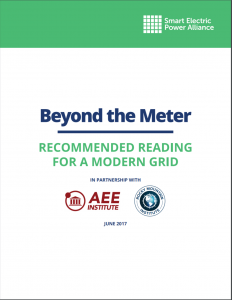Full Title: Beyond the Meter: Recommended Reading For a Modern Grid
Author(s): Smart Electric Power Alliance
Publisher(s): Advanced Energy Economy
Publication Date: June 1, 2017
Full Text: Download Resource
Description (excerpt):
Keeping up with the influx of new information on distributed energy resources (DERs) can be daunting. The energy industry’s focus on DERs is driven by their potential to help solve the problems in modernizing the grid. In 2015, U.S. electric utilities spent $103 billion in capital expenditures to maintain and upgrade the grid, and they now expect average annual spending of around $100 billion through 2018, even as growth in electricity demand slows.
Combined, new investments needed to maintain and upgrade the grid and reduced load growth could raise retail rates significantly for electricity customers. If the grid is to be modernized for twoway energy flows and incorporate new, connected technologies while maintaining minimal rate impacts, then all available resources, including DERs, need to be put to their best use.
To reach this goal, we need to start with a common base of foundational knowledge on DERs. Therefore, we have assembled a document identifying key articles and resources that are easily available to all stakeholders to use as a knowledge base. Working together to compile this list was an initial collaborative effort for co-authors Advanced Energy Economy Institute (AEE), Rocky Mountain Institute (RMI) and the Smart Electric Power Alliance (SEPA), three organizations with similar long-term visions of a clean energy future, but with different approaches and perspectives.
We started from a basic, common understanding about DERs: that they can provide positive net value to the grid, such as avoided infrastructure investments, improved resilience, and increased integration of clean energy. However, integration of these resources will require a new planning paradigm. Finally, the solutions for the challenges that lie ahead will be rooted in information sharing, partnerships, and collaboration.
Our goal here is not to forecast the future of DERs, but to provide, in effect, a “DERs 101” syllabus that demonstrates the value of DERs and provides insights.
